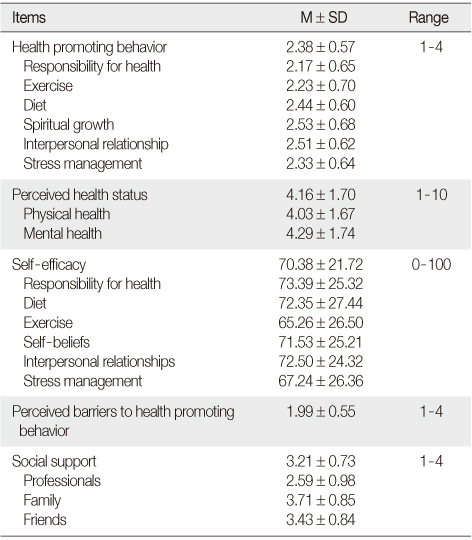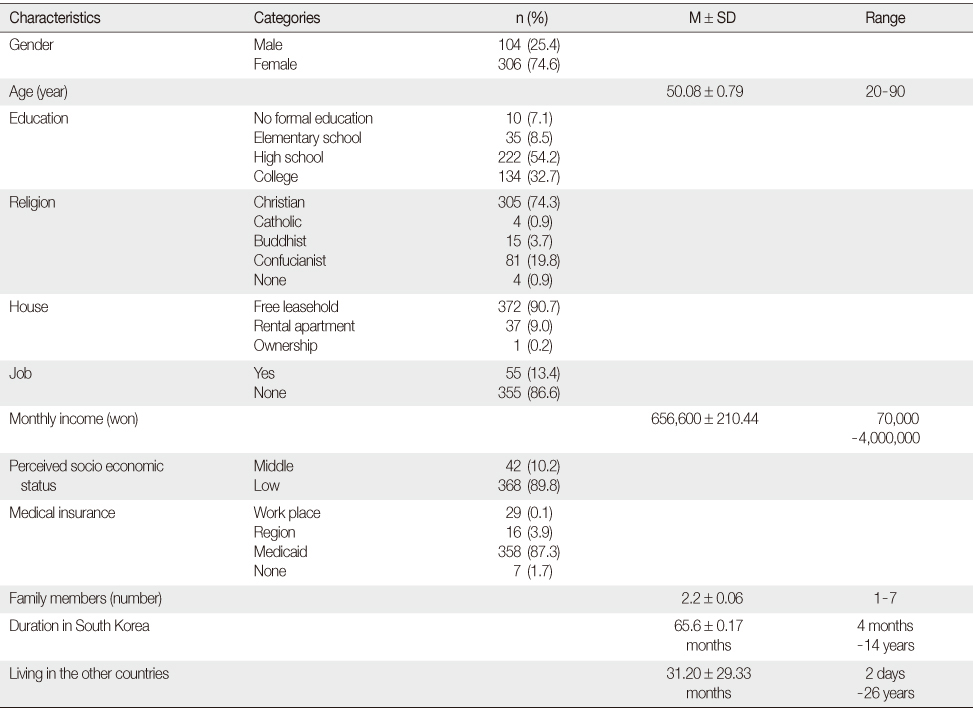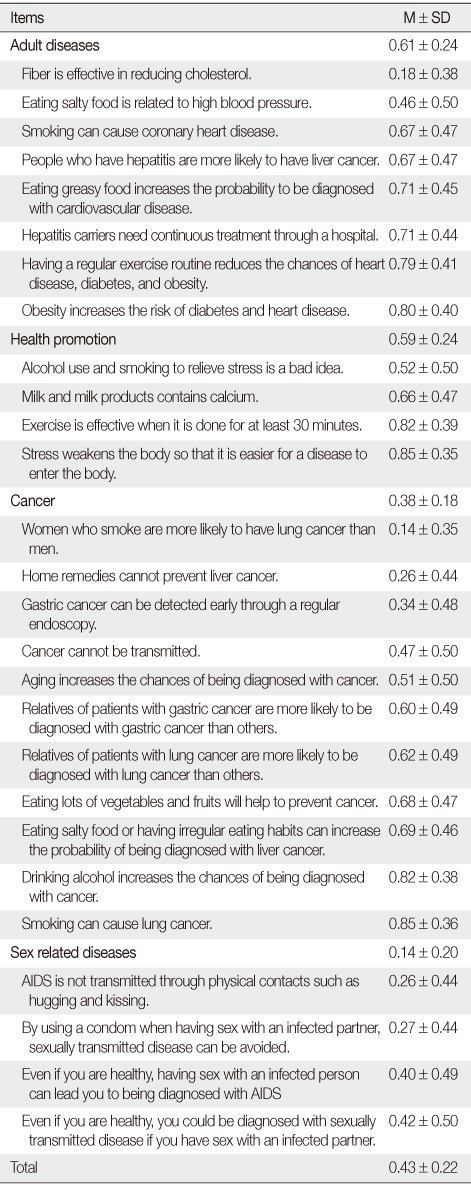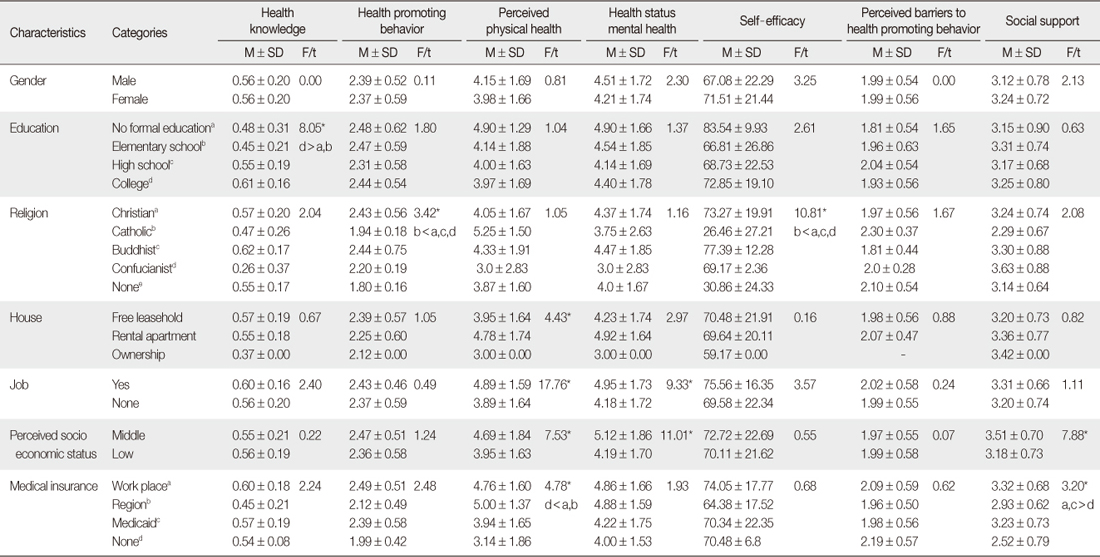Articles
- Page Path
- HOME > J Korean Acad Nurs > Volume 42(5); 2012 > Article
-
Original Article
- Health Knowledge, Health Promoting Behavior and Factors Influencing Health Promoting Behavior of North Korean Defectors in South Korea
- Myoung-Ae Choe, Myungsun Yi, Jung-An Choi, Gisoo Shin
-
Journal of Korean Academy of Nursing 2012;42(5):622-631.
DOI: https://doi.org/10.4040/jkan.2012.42.5.622
Published online: October 31, 2012
1School of Nursing, Seoul National University, Seoul, South Korea.
2Research Institute of Nursing Science, Seoul National University, Seoul, South Korea.
3Red Cross College of Nursing, Chung-Ang University, Seoul, South Korea.
- Address reprint requests to: Shin, Gisoo. Chung-Ang University, Red Cross College of Nursing, 8 Gyunggyojang-gil, Jongno-gu, Seoul 110-102, Korea. Tel: +82-2-3700-3670, Fax: +82-2-3700-3400, gisoo@cau.ac.kr
© 2012 Korean Society of Nursing Science
- 1,149 Views
- 9 Download
- 15 Crossref
Abstract
-
Purpose
- The purpose of this study was to identify health knowledge, health promoting behavior and factors influencing health promoting behavior of North Korean defectors in South Korea.
-
Methods
- Participants in this study were 410 North Korean defectors, over 20 years of age residing in Seoul. They were recruited by snowball sampling. Data were collected from April to June, 2010. Health knowledge, health promoting behavior, self-efficacy, perceived barriers to health promoting behavior and social support were measured by structured questionnaires, and perceived physical and mental health status were measured by one item with 10-point numeric rating scale. The data were analyzed using t-test, ANOVA, and multiple regression.
-
Results
- Health knowledge, health promoting behavior, and perceived barriers to health promoting behavior were moderate while self-efficacy and social support were high. Factors influencing health promoting behavior of the participants were found to be self-efficacy, social support and perceived barrier to health promoting behavior.
-
Conclusion
- The results of this study indicate that nursing intervention programs enhancing self-efficacy, social support and reducing perceived barriers to health promoting behavior need to be developed for North Korean defectors in South Korea.
This study was supported by grants from the Institute for Peace and Unification Studies of Seoul National University in 2010.
- 1. Byun HS, Kim KH. A study on the pain, perceived exercise barrier according to the general characteristics and exercise stage in the elderly with degenerative osteoarthritis. J Korean Gerontol Soc. 2006;26(1):17–30.
- 2. Choe M, Choi J. A study on treatment-seeking behavior of middle-aged and old-age Saetomins in South Korea. J Peace Unification Stud. 2009;1:285–316.
- 3. Ha YS. A study on the support policy and adaptation of North Korean refugees. Korean J Polit Sci. 2010;17(1):125–142.
- 4. Han IY, Lee SR. North Korean defectors depressive traits, alcohol and tobacco consumption and their perceived well-being. Korean J Fam Soc Work. 2002;10:121–142.
- 5. Han KS. Self efficacy, health promoting behaviors, and symptoms of stress among university students. J Korean Acad Nurs. 2005;35:585–592.ArticlePDF
- 6. Jeon EY, Kim KB. A study of factors that influence the promotion of healthy behavior in the elderly according to types of residency. J Korean Acad Nurs. 2006;36:475–483.ArticlePDF
- 7. Jeon WT, Yu SE, Cho YA, Hong C, Um JS, Seo SW. 3 year follow up study of the way of thinking and satisfaction level of north Korean defectors in South Korea. J Korean Neuropsychiatr Assoc. 2006;45:252–268.
- 8. Jeon YS, Kang HY. The analysis of perceived career barriers by female North Korean defectors: Focusing on age, level of education, length of residence in South Korea. Korean J Woman Psychol. 2010;15:469–487.
- 9. Jeong N, Lee MH. A predictive on health promotion behavior in women who immigrate for marriage. J Korean Acad Nurs. 2010;40:695–704. http://dx.doi.org/10.4040/jkan.2010.40.5.695.ArticlePubMed
- 10. Jo YA. Understanding of psychologic aspects for North Korean defector. Paper presented at the meeting of missionary work for North Korean defectors. 2006;04;Seoul.
- 11. Kim IS. Relationships between social-environmental factors and psychological distress among Korean women in poverty. 2004;Seoul, Seoul National University. Unpublished doctoral dissertation.
- 12. Kim MH. An explanatory model for health promoting behaviors in patients living at home who have post stroke hemiplegia. J Korean Acad Nurs. 2006;36:1065–1075.ArticlePDF
- 13. Kim MH, Kim MS. A study on the relationships between knowledge about osteoporosis and cognitive factors in middle-aged women. Korean J Women Health Nurs. 2005;11:52–57.ArticlePDF
- 14. Kim YJ. Comparison of health practices between single- and multiple-member households by gender in Korean adults. J Korean Acad Public Health Nurs. 2009;23:219–231.
- 15. Lee DS. Structural model development of health insensitivity. 2003;Seoul, Seoul National University. Unpublished doctoral dissertation.
- 16. Lee MH, Song MS, Woo KH. Relationship among powerlessness, self-efficacy and quality of life in hemodialysis patients. Korean J Rehabil Nurs. 2002;5:166–179.
- 17. Lee YS, Ku HW, Han IY. Systematic reviews of North Korean refugees: Women's distinguishable experience. Korean J Unification Aff. 2011;23(2):147–193.
- 18. Ministry of Government Legislation. The free resource archives. Retrieved April 15, 2012. from http://oneclick.law.go.kr/CSP/CnpClsMain.laf?popMenu=ov&csmSeq=111&ccfNo=1&cciNo=1&cnpClsNo=2.
- 19. Ministry of Heath & Welfare. The free resource archives. Retrieved April 15, 2012. from http://www.mw.go.kr/front/al/sal0301vw.jsp?PAR_MENU_ID=04&MENU_ID=0403&CONT_SEQ=251004&page=1&SEARCHKEY=CONTENT&SEARCHVALUE.
- 20. Ministry of Unification. The free resource archives. Retrieved October 15, 2010. from http://www.unikorea.go.kr/CmsWeb/viewPage.req?idx=PG0000000365.
- 21. Park CS, Choi ES. Health promoting life style in middle-aged women by menstrual status. J Korean Acad Womens Health Nurs. 1995;1(2):234–242.ArticlePDF
- 22. Pender NJ. Health promotion in nursing practice. 1996;3rd ed. Stamford, CT, Appleton and Lange.
- 23. Seo JH, Ryu HS. Relations among depression, life satisfaction and health promoting behavior in the elderly. J Korean Acad Community Health Nurs. 2010;21:169–177.Article
- 24. Shin GS, Cho KC, Yang SH, Lee OC, Baek HC, Lee GY, et al. Quality of life of North Korean defectors in Korea. J Korean Acad Public Health Nurs. 2011;25:221–232.
- 25. Sok SR, Shin SH. Comparison of the factors influencing children's self-esteem between two parent families and single parent families. J Korean Acad Nurs. 2010;40:367–377. http://dx.doi.org/10.4040/jkan.2010.40.3.367.ArticlePubMed
- 26. Song IH, Park JH. The effect of parent-child bonding on adolescent health promotion behavior: A study on the mediating effect of self-efficacy. Korean J Youth Stud. 2011;18(6):75–98.
- 27. Suh IS. Health knowledge level and health-promoting behavior of the elderly. J Korea Gerontol Soc. 2000;20(2):1–28.
- 28. Yoon IJ, Kim S. Health and medical care of North Korean defectors in South Korea. Health Soc Sci. 2005;17:149–182.
REFERENCES

Figure & Data
REFERENCES
Citations

- Assessment of diet quality of adults from North Korea: using nutrition quotient (NQ) for Korean adults
SaeByeol Kwon, Kyoung-Nam Kim, Moon-Kyung Shin
Journal of Nutrition and Health.2023; 56(2): 217. CrossRef - The impact of health education videos on general public’s mental health and behavior during COVID-19
Qian Yang, Zhihua Wu, Ying Xie, Xiaohua Xiao, Jinnan Wu, Tian Sang, Kejun Zhang, Haidong Song, Xifeng Wu, Xin Xu
Global Health Research and Policy.2021;[Epub] CrossRef - Social networks and health-promoting behaviors among North Korean refugees in South Korea
Chung Hyeon Jeong, Mee Young Um, Joan P. Yoo, Lawrence A. Palinkas
Social Work in Health Care.2020; 59(9-10): 738. CrossRef - The influences of socio‐individual determinants and health information seeking on health‐promoting behaviors among migrant women: A cross‐sectional study
Jung‐ae Ahn, Duckhee Chae
Japan Journal of Nursing Science.2019; 16(4): 481. CrossRef - Evaluation of customized oral health promotion program for North Korean defector
Kiha Jeon, Suyoung Lee
Journal of Korean Academy of Oral Health.2018; 42(4): 109. CrossRef - Health-Promoting Behavior and Influencing Factors in Young North Korean Refugees (NKRs) Living in South Korea
Jumin Park, Young Dae Kwon, Hyunchun Park, Shi Eun Yu, Jin-Won Noh
Journal of Immigrant and Minority Health.2018; 20(6): 1355. CrossRef - Cervical Cancer Screening and Its Associated Factors Among North Korean Defectors Living in South Korea
Jeongok Park, HeesSook Kim, Wonhee Yang, HaeWon Lee, Sang Min Park
Journal of Immigrant and Minority Health.2018; 20(1): 66. CrossRef - Association of Anxiety, Depression, and Somatization with Menstrual Problems among North Korean Women Defectors in South Korea
Hyun Kyoung Kim, Hee Sook Kim, Seog Ju Kim
Psychiatry Investigation.2017; 14(6): 727. CrossRef - The Trends in Research on the Health of North Korean Refugees
Hyun-Ju Lim, Guna Lee, Sook-Ja Yang
Journal of Korean Academy of Community Health Nursing.2017; 28(2): 144. CrossRef - Health Literacy and Its Related Factors in North Korean Refugees
Youn Jung Son, Hyun Joon Kim, Hye Jin Jeong, In Young Hwang, Moo Young Kim, Soo Hyoung Lee, Ki Hyun Park, Kee Ho Park, Chae Bong Kim, Hyang Im, Ji Young Lee
Korean Journal of Health Promotion.2017; 17(2): 71. CrossRef - Changes in body weight and food security of adult North Korean refugees living in South Korea
HaYoung Jeong, Soo-Kyung Lee, Sin-Gon Kim
Nutrition Research and Practice.2017; 11(4): 307. CrossRef - Awareness and Knowledge about Hepatitis B among North Korean Immigrants
Min Jeong Park, Jeong Hee Jeon, Hyo Jeong Song
The Korean Journal of Rehabilitation Nursing.2016; 19(1): 64. CrossRef - A Study of Predictive Factors Affecting Health: Promoting Behaviors of North Korean Adolescent Refugees
Jin-Won Noh, Hyo-Young Yun, Hyunchun Park, Shi-Eun Yu
Journal of Preventive Medicine and Public Health.2015; 48(5): 231. CrossRef - Predictors of Breast Self Examination Practice among North Korean Immigrant Women
Mi Yeul Hyun, Hyo Jeong Song, Eun Joo Lee, Seong Chul Hong, Sung Yob Kim, Chang Hyun Lee
Korean Journal of Health Promotion.2015; 15(1): 9. CrossRef - Influencing Factors on the Health Promotion Behaviors of North Korean Refugee Adolescent in a Specialization School
Eunkyoung Jun, Jinhwa Lee, Soon-Lae Kim, Min-Jeoung Kang, InSook Kwon
Korean Journal of Health Education and Promotion.2013; 30(3): 13. CrossRef
Sociodemographic Characteristics of Participants (N=410)
Health Knowledge of Participants (N=410)
AIDS=Acquired immune deficiency syndrome.
Health Promoting Behavior, Perceived Health Status, Self-efficacy, Perceived Barriers to Health Promoting Behavior, and Social Support of Participants (N=410)
Health Knowledge, Health Promoting Behavior, Perceived Health Status, Self-Efficacy, Perceived Barriers to Health Promoting Behavior, and Social Support by Sociodemographic Characteristics of Participants. (N=410)
*p<.001.
Factors Influencing Health Promoting Behavior of Participants (N=410)
AIDS=Acquired immune deficiency syndrome.
*
 KSNS
KSNS
 E-SUBMISSION
E-SUBMISSION




 Cite
Cite

